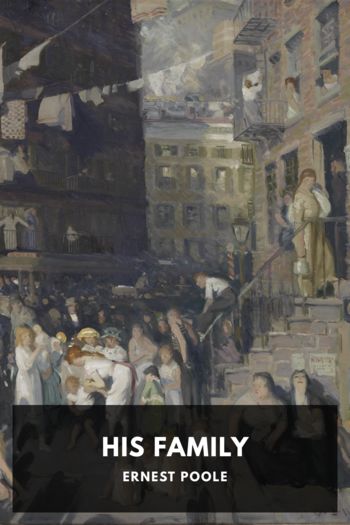His Family - Ernest Poole (ereader for comics .txt) 📗

- Author: Ernest Poole
Book online «His Family - Ernest Poole (ereader for comics .txt) 📗». Author Ernest Poole
But again the business was running down, and this time he must jerk it back before it got beyond him. He set himself doggedly to the task, calling in his assistants one by one, going through the work in those outer rooms, where at tables long rows of busy young girls, with colored pencils, scissors and paste, were demolishing enormous piles of newspapers and magazines. And vaguely, little by little, he came to a realization of how while he had slumbered the life of the country had swept on. For as he studied the lists and the letters of his patrons, Roger felt confusedly that a new America was here.
Clippings, clippings, clippings. Business men and business firms, gigantic corporations, kept sending here for clippings, news of themselves or their rivals, keeping keen watch on each other’s affairs for signs of strength or weakness. How savage was the fight these days. Here was news of mines and mills and factories all over the land, clippings sent each morning by special messengers downtown to reach the brokers’ offices before the market opened. One broker wrote, “Please quote your terms for the following. From nine to two o’clock each day our messenger will call at your office every hour for clippings giving information of the companies named below.”
The long list appended carried Roger’s fancy out all over the continent. And then came this injunction: “Remember that our messenger must leave your office every hour. In information of this kind every minute counts.”
Clippings, clippings, clippings. As Roger turned over his morning mail, in spite of himself he grew absorbed. What a change in the world of literature. What a host of names of scribblers, not authors but just writers, not only men but women too, novelists and dramatists, poets and muckrakers all jumbled in together, each one of them straining for a place. And the actors and the actresses, the musicians and the lecturers, each with his press agent and avid for publicity, “fame!” And here were society women, from New York and other cities, all eager for press notices of social affairs they had given or managed, charity work they had conducted, suffrage speeches they had made. Half the women in the land were fairly talking their heads off, it seemed. Some had been on his lists for years. They married and wanted to hear what was said in the papers about their weddings, they quarreled and got divorces and still sent here for clippings, they died and still their relatives wrote in for the funeral notices. And even death was commercialized. A maker of monuments wanted news “of all people of large means, dead or dangerously ill, in the State of Pennsylvania.” Here were demands from charity bodies, hospitals and colleges, from clergymen with an anxious eye on the Monday morning papers. And here was an anarchist millionaire! And here was an insane asylum wanting to see itself in print!
With a grim smile on his heavy visage, Roger stared out of his window. Slowly the smile faded, a wistful look came on his face.
“Who’ll take my business when I’m gone?”
If his small son had only lived, with what new zest and vigor it might have been made to grow and expand. If only his son had been here by his side. …
IXDeborah needed rest, he thought, for the bright attractive face of his daughter was looking rather pale of late, and the birthmark on her forehead showed a faint thin line of red. One night at dinner, watching her, he wondered what was on her mind. She had come in late, and though several times she had made an effort to keep up the conversation, her cheeks were almost colorless and more than once in her deepset eyes came a flash of pain that startled him.
“Look here. What’s the matter with you?” he asked. Deborah looked up quickly.
“I’d rather not talk about it, dad—”
“Very well,” he answered. And with a slight hesitation, “But I think I know the trouble,” he said. “And perhaps some other time—when you do feel like talking—” He stopped, for on her wide sensitive lips he saw a twitch of amusement.
“What do you think is the trouble?” she asked. And Roger looked at her squarely.
“Loneliness,” he answered.
“Why?” she asked him.
“Well, there’s Edith’s baby—and Laura getting married—”
“I see—and so I’m lonely for a family of my own. But you’re forgetting my school,” she said.
“Yes, yes, I know,” he retorted. “But that’s not at all the same. Interesting work, no doubt, but—well, it isn’t personal.”
“Oh, isn’t it?” she answered, and she drew a quivering breath. Rising from the table she went into the living room, and there a few moments later he found her walking up and down. “I think I will tell you now,” she said. “I’m afraid of being alone tonight, of keeping this matter to myself.” He looked at her apprehensively.
“Very well, my dear,” he said.
“This is the trouble,” she began. “Down in my school we’ve a family of about three thousand children. A few I get to know so well I try to follow them when they leave. And one of these, an Italian boy—his name is Joe Bolini—was one of the best I ever had, and one of the most appealing. But Joe took to drinking and got in with a gang of boys who blackmailed small shopkeepers. He used to come to me at times in occasional moods of repentance. He was a splendid physical type and he’d been a leader in our athletics, so I took him back into the school to manage our teams in basketball. He left the gang and stopped drinking, and we had long talks together about his great ambition. He wanted to enter the Fire Department as soon





Comments (0)